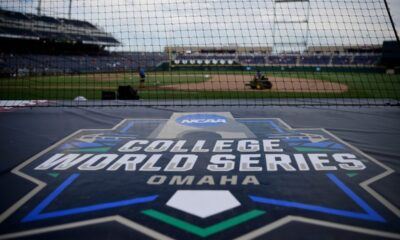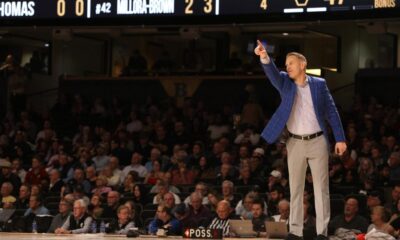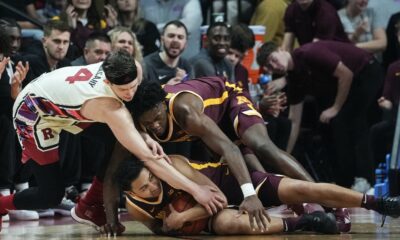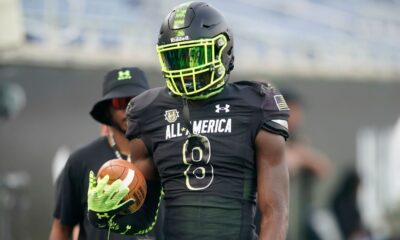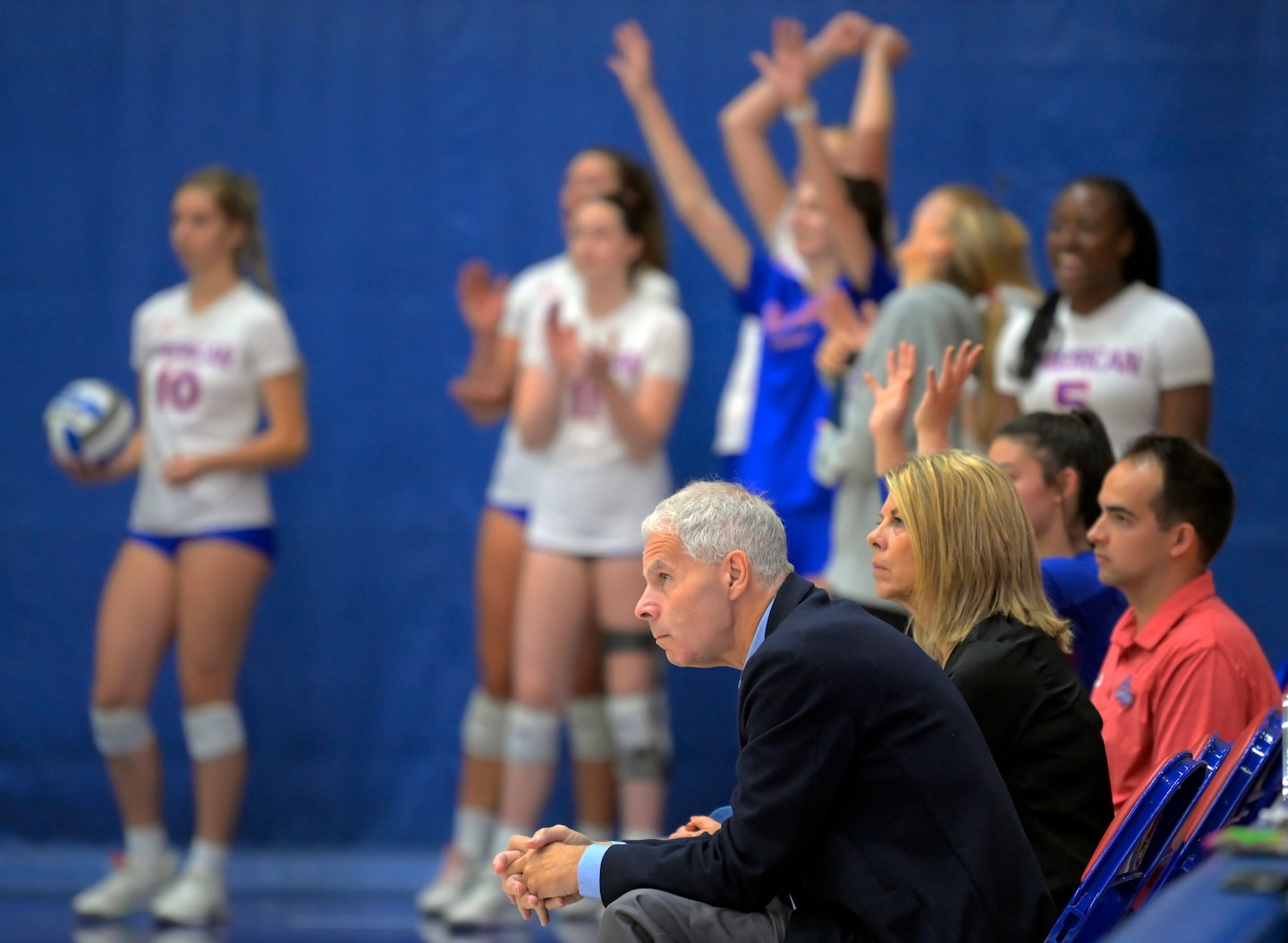
“Your whole career has been ‘make the most of it,'” his wife Bonnie recently told him.
And now, at age 60, with stomach cancer that has spread to his bones and has reached stage 4, Goldberg’s tone is factual. He always tells his players to ignore their worries, “because the whole world is in trouble.” There is always a solution.
He seems to think his health is the same. Instead of him sitting at home, he continues coaching. He doesn’t talk about his cancer in depth, he doesn’t count his days. He hasn’t asked his players what they think of their illness. He doesn’t seem to have much room for grief.
A few weeks after receiving his diagnosis in February, he went to recruit.
“Let’s make something,” he says. “What should I do while I’m still alive?”
Over the years, he rarely coached during games, but instead sat quietly, legs crossed, in seemingly constant composure, even when the game fell apart. He froze his face. He believed he had been coaching him in practice, so it was up to the players to resolve the situation, just as they would have to for the rest of their lives.
“Understand it,” he always says.
Exhausted by cancer, he spent most mornings sleeping at home in Damascus, Maryland, raising his children with Bonnie. But then Bonnie or his eldest son Mitch takes him to his office in Bender’s arena, where he plans exercises, watches movies, devises strategies, and tries to coach in the usual way. increase. He says he’s doing this to create normality for his players after two were cut short during the pandemic.
However, we all know the reason he continues to coach the American volleyball team is because it’s the only thing he ever wanted to do.
“We like using each other, the team and him,” says senior setter Inbal Peleg. “We need him here, but he needs us too.”
Goldberg loves to talk about his team. The biggest burst of his energy comes when the topic is volleyball. His eyes dance as he talks about past players and championships. A ball from each of his milestone wins hangs on the wall of his office.A few years ago, the NCAA website published an article ranking his 10 biggest upsets in women’s college volleyball. has been published. The American had his first-round NCAA Tournament victory over Kentucky in 2015 and his second-round victory over Duke in 2013, giving the AU its only Suite 16.
“It was a small school compared to the other huge schools we play in,” he says.
He took the AU’s volleyball team from zero to 18 NCAA Tournament appearances, perhaps the most unlikely force in the sport. The President’s Day weekend tournament at the Washington Convention Center is he one of the biggest tournaments in youth volleyball. His top assistant his coach, Sara Katz Illyep, says he “can’t take five steps” with him without someone greeting him at a coach’s convention.
Bonnie was by his side the whole time. A former volleyball player and coach herself, she and Barry began dating in the late 1980s as her assistant coach at Georgetown University and married in 1989 after he took a job in the United States. , running tournaments that turned into a full-time job, and now speaks with Parade of Doctors.
The player describes Bonnie as being “like a mother” to them, talking to the team when Barry is unable to, and explaining to the player’s parents what is happening to her husband. She administered chemotherapy, watched him suffer as the treatment devastated him, and oversaw the decision to stop when scans showed the cancer had not gone away.
Now she spends her mornings planning tournaments and the rest of her days navigating new doctors who are trying integrative treatments with innovative ideas about diet. Give Barry a drip of vitamins. She reads everything she can about treatments. She tells Barry about successes such as a recent study in which her patients saw their cancer disappear, although she could not fully explain why.
“We accept the unexplainable,” she says.
Barry becomes obsessed with these stories. He can’t participate in clinical trials because he doesn’t have a visible tumor in his stomach, but they give him hope: he’s done miracles in his AU volleyball program.
Bonnie didn’t really want Barry to go to Recruit last summer, but of course she agreed. “The harder he fights, the harder I fight.”
She packed 50 pounds of special food and a blender and set off on her journey. They went to Orlando for her AAU Championship. They went on a short vacation to Melbourne Beach, Florida. They went to Indianapolis for the American Junior Nationals.They returned to Washington for summer volleyball camp. They took the AU team on a bonding trip to Sandbridge, Virginia.
Then they went home and the season started. In September, Barry took his 800th victory. This is what his three other active coaches have achieved. It happened during a tournament with multiple teams playing multiple times at the Bender Arena that day. In between games, Bonnie takes Barry to a local hotel so he can sleep.
“I don’t think I’ve ever asked or felt why? Why him, why us?” Bonnie says she sits across from Barry in his office. “It’s not who we are. It’s why it’s not us. Why doesn’t this happen to us? Do you think there is? …
“We’ve been through a lot in life. We have great kids, we have three great kids. We have five great grandchildren. He’s here in this career, Having built this storied career, we’ve had a lot, why can’t it happen to us?
Across the room, Barry listens and nods.
“You can see how much it can do for us,” he says.
When Goldberg was hired in 1989, there was no reason to suspect American University volleyball would boom. His job did not go well, so he had to continue in his second job, a drug counselor, but it was his only chance to have a team of his own.
He knew he had to do something else. He invented tradition when there was no tradition. To inspire leadership, he had each player give a pre-game speech. Starting with the oldest senior in Game 1 to the youngest freshman. To build attitude, he had teams write the names of every opponent they had won 3-0 on a wooden box where players stood to actually spike his ball. .
He recruited countries like Israel, Poland, and Turkey to find talented prospects who didn’t mind if the AU was in the middle of a big city and it wasn’t a big conference. At youth tournaments, he looked for unpolished and taller players, but he believed that if he was patient during his coaching, he would do well one day. He made himself a coach who doesn’t coach at games.
“Every time I play for him, I understand why he was able to build here,” says AU senior Onuchi Ndee. “He’s cool as a cucumber.”
Victory came at last. American won the Colonial Athletic Association in Goldberg’s ninth season, plus he won the CAA twice before moving to the Patriot League. There, AU had not lost a conference match in his four years and lost only his 18 games in his first 19 seasons.
“We are a small school in DC, and many of you may not have heard of it, but when I was talking to people in the volleyball world about American University, something unusual happened here and everyone I know,” says Goldberg.
The decade then led to another decade. Memories were made inside this gym under the parking lot. Goldberg’s daughter Ariel and son Jared hit volleyballs around the court, Mitch hit a lacrosse ball on the sidewall, and Jared and Mitch played candy-stand mini-golf for hours on their assistant’s computer. O’Neill appeared at Bender’s, and the children—still small—climbed over him.
From time to time, bigger schools called Goldberg, and he always said no. he had a house he didn’t need a new one.
“I don’t think he’s as focused on winning volleyball games as he is on building teams, creating individual players who can play on teams, and building that culture,” says son Mitch.
Recently, an old Goldberg player is returning as rumors of Goldberg’s illness spread. This excited him. He likes meeting the women he has mentored and their children. He wants to know everything about their lives. A few weeks ago, his early team setters showed up. She was a talented player, but she and Goldberg fought well — the young player and the new coach didn’t understand each other very well — and when she graduated, he never expected to see her again. I didn’t think so. However, about 30 years later, she was with her children.
he fell to the floor They talked for two hours about their lives, about volleyball, about their regrets.
“It was amazing,” he says.
Inside the office, Barry sees Bonnie. They talked about his willingness to continue coaching and the players, and the joy volleyball brought him. was
“My question to you is, are you doing what you want to do?” he asks.
She looks at the visitors sitting near them on the couch in the office.
“I’ve been married to this man for 35 years and never needed a break. Why take a break now?” “Now is not the time to rest. This is the time to turn it on. We know there is a clock. We all have clocks. He’s ticking.” You just know, you just do what you can, and what happens, what happens.
The Americans are just 4-4 in the Patriot League this season and have not been dominant since 2019. Other Patriot League teams are adding scholarships, coming closer to Season 12, when Goldberg funded the school years ago. With the rise of international scouting services, Goldberg means that instead of competing for one or two colleges and overseas players, Goldberg is now competing with as many as 25 to 30 colleges. Some are injured.
Days after speaking in the office, Goldberg is standing by the court at Bender Arena after winning. It’s been a long day for him and he had an IV in the early afternoon. He took a nap in his office until about 90 minutes before the game. He looked tired during the match, several times he lowered his head and stared at the floor. Bonnie sat next to him and played the game.
But the victory revived him. He shines as players and his parents gather outside the locker room to celebrate. he tells a story. he laughs For a while it was just a regular game his night at American like his 33 years so far.
After most people had left, Goldberg looked up at the long line of conference championship banners hanging above him and smiled.
“A nice little legacy in a place like this,” he says. “I’d like to have a few more before I leave here, but I don’t know if I can.”
He then looks down. It’s late, he’s tired and ready to go home again. He turned to Bonnie and wordlessly walked off the court and out of the place he loved most.


